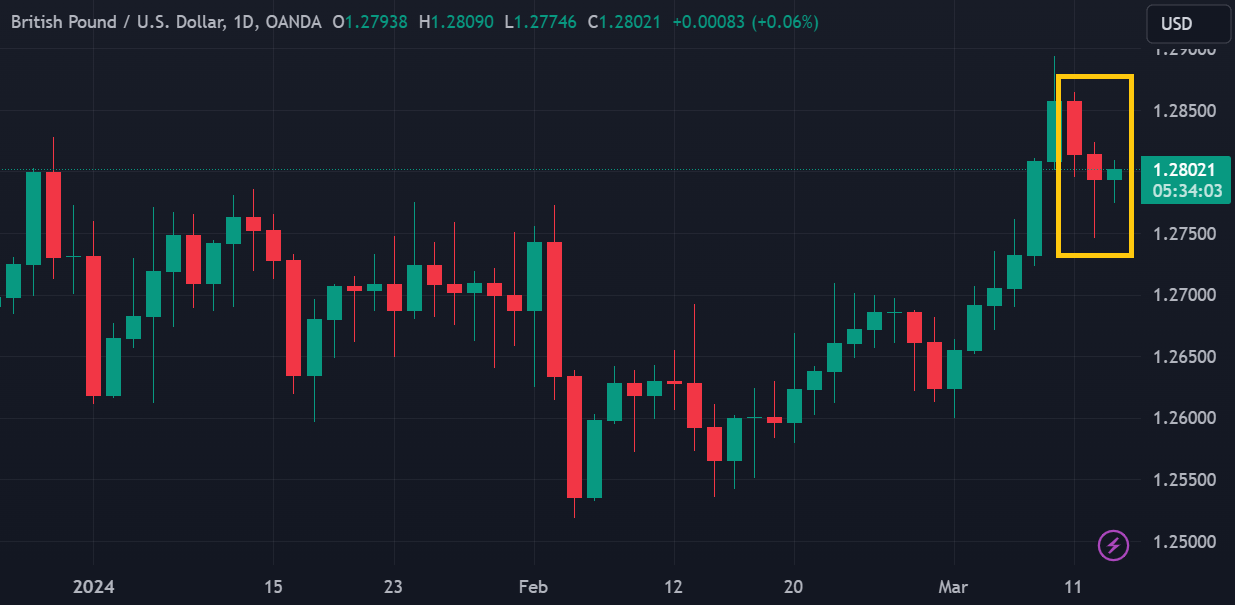UK economic growth matched estimates in January, stemming the GBP/USD slump.
The Pound Sterling exchange rate stabilized near the 1.2800 range against the US dollar in New York session trading on Wednesday (13/March). The release of Gross Domestic Product (GDP) data this afternoon showed the UK economy grew in line with estimates in January, stemming the GBP/USD slump.

The UK Office for National Statistics (ONS) reported that UK GDP growth reached 0.2% (m/m) in January 2024. The figure made up for the -0.1% pullback in the previous period while matching the consensus forecast.
The details of the ONS report revealed a strong recovery in the services sector, the most dominant area of the UK economy. In addition, growth was supported by a surge in construction output. These details improved market expectations for the UK's economic outlook.
"The economy is starting to turn a corner. The technical recession that the UK slipped into late last year will be short-lived. And we should see growth gradually return to its trend rate over the course of the year, as sentiment continues its uptrend and fiscal and monetary policy loosen through 2024," says Sanjay Raja, Chief UK Economist at Deutsche Bank.
"Momentum is likely to remain weak in the near-term, but the outlook for this year is improving. With both energy and domestic inflation moderating faster than expected, the chance of a modest cut in interest rates in the summer has risen. And the recent Budget will deliver some added relief for consumers and build on the measures in the Autumn Statement to strengthen incentives for business investment," says Ben Jones, Lead Economist at the CBI.
The Pound Sterling exchange rate edged higher against a variety of other major currencies following the release of the data set, not just in GBP/USD. GBP/JPY was observed to climb by around 0.15 percent to 189.10. The EUR/GBP rally was also suspended at around 0.8550.
At the same time, this data did not disturb expectations of a BoE rate cut. Forecasts are still the same as yesterday after the release of UK labor data. Some market participants expect the BoE to start cutting rates in June, but the majority still believe the prospect of an early policy change in August.

 Dedicated FREE FOREX VPS
Dedicated FREE FOREX VPS Free FOREX Virtual Private Server
Free FOREX Virtual Private Server MT4 Demo Contest, Get $500
MT4 Demo Contest, Get $500 Sign Up for an Account, Claim 60% Deposit Bonus
Sign Up for an Account, Claim 60% Deposit Bonus Free MT4/MT5 VPS 2024
Free MT4/MT5 VPS 2024 Send E-mail and Get Free Merchandise
Send E-mail and Get Free Merchandise $1K Refer a Friend Bonus for Pepperstone Pro clients
$1K Refer a Friend Bonus for Pepperstone Pro clients Maximize Your Earnings with 100% Deposit bonus
Maximize Your Earnings with 100% Deposit bonus Trade to Win, $5,000 Monthly Demo Contest
Trade to Win, $5,000 Monthly Demo Contest Claim 30% + 15% Deposit Bonus from LiteFinance
Claim 30% + 15% Deposit Bonus from LiteFinance






